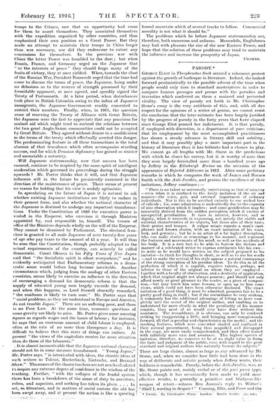PARODY.* GEORGE ELIOT in Theophraetus Such uttered a vehement protest
against the growth of burlesque in literature. Indeed, she looked forward pessimistically to the possible advent of the time when people would only turn to standard masterpieces in order to compare famous passages and poems with the parodies and travesties which conferred on them a maimed and perverted vitality. The view of parody set forth in- Mr. Christopher Stone's essay is the very antithesis of this, and, with all dui respect for the opinions of a writer of genius, we cannot resist the conclusion that the later estimate has been largely justified by the progress of parody in the forty years that have elapsed since George Eliot penned her indictment. It is that parody, if employed with discretion, is a department of pure criticism ; that its employment by the most accomplished -practitioners has shown a steady advance in literary- skill and subtlety ; and that it may possibly play a more important part in the history of literature than it has• hitherto had. a chance to play. We cannot go all lengths with Mr...Stone in the predictions with which he closes his survey, but it is worthy oLnote that they were largely forestalled more than a hundred years ago
by Jeffrey in the Edinburgh, -Review on the occasion of the appearance of Rejected Addresses in 1812. After. some prefatory remarks in which he compares, the work of James and Horace Smith with the Anti-Jacobin, and praises the excellence of their imitations, Jeffrey continues :— • " There is no talent so universally entertaininc, as that of• mimicry —even when it is confined to the. lively imitation of the air and manner—the voice, gait, and external deportment of ordinary individuals. Nor is this to be ascribed entirely to our wicked Mve of ridicule; for, some admiration is undoubtedly clue to the capacity of nice observation which it implies ; and some gratification may be innocently derived from the sudden -perception, which it excites of unexpected. peculiarities. It rises in interest, however, and in dignity, when it succeeds in expressing, not merely the visible and external characteristics of its objects, but those also of their tast', their genius and' temper. A vulgar mimic repeats a. mates cant- phrases_ and known stories, with an exact imitation of his voice, look, and gestures ; -but he is an artist of a far higher description, who can make stories or reasonings in his manner, and represent the features and movements of his mind, as well as the accidents of his body. It is a rare fact -to 13e able to borrow the diction and manner of a celebrated writer to express sentiments- like his own— to write as he would have written on the subject proposed to hie imitator—to think hit thoughts in short, as well as to use his words —and to make the revival of his style appear a natural consequenge of the strong conception of his peculiar ideas. To do this in all the perfection of which it is capable, requires talents,, perhaps, not inferior to those of the original on whom they are employed— together with a faculty of observation, and a dexterity of application, which that original might not always possess ; p.nd should not only afford nearly as great pleasure to the reader, as a piece of composi- tion,—but may teach him some lessons, or open up to him some views, which- could not have been otherwise disclosed. The exact imitation of a good thing, it must be admitted, promises fair to be a pretty good thing in itself ; but if the resemblance he very striking, it commonly has the additional advantage of lotting us more com- pletely into the secret of the original author, and enabling us to understand -far more clearly in what the peculiarity, of his manner consists, than most of us would ever have done without this assistance. The resemblance, it is obvious, can only be rendered striking by exaggerating a little, and bringing more -conspicuously forward, all that is peculiar and characteristic in the model ; and the marking features, which were somewhat shaded and confused in their natural presentment, being thus magnified and disengaged in the copy, are more easily comprehended, and their effect traced with infinitely more ease and assurance. This highest species of imitation; therefore, we conceive to he of no slight value in fixing the taste and judgment of the public, even with regard to the great standard and original authors who naturally became its subjects."
These are large claims, almost as large as any advanced by Mr. Stone, and, when we consider how little had been done in the way of deliberate and artistic parody when Jeffrey wrote, their boldness is remarkable. Parody, before the Anti-Jacobin, was, as Mr.. Stone points out, mainly verbal or of the pftri pasni type, which, though it has occasionally been made to yield • most effective results, is . generally •a primitive and bludgeon-like weapon of retort—witness Ben Jonson's reply to Wither's "Shall I, wasting in despair ?" Canning, Ellis, and Frere and the
• Parody. By Christopher Stone. London : Martin Seeker. as. net.I
brothers Smith were the first to recognize and illustrate the higher functions of parody. Since their day the best parodists have been without exception men of remarkable literary equip- ment, taste, and skill, when they have not actually attained
distinction as poets. Among the poets who have not disdained the cultivation of parody the most notable are James Hogg, who wrote some of the longest as well as the most elaborate parodies in existence, Swinburne, and Rossetti. Swinburne's efforts in this genre arc perhaps best remembered for the parody of himself, which Mr. Stone rightly considers to be decidedly inferior to other
travesties of his style, notably the superb " Octopus " of A. C. Hilton, which combines burlesque with criticism in the highest degree. But Swinburno was only following the example of Hogg, Coleridge, and Lamb, who all " tried their hands at giving themselves away." Rossetti's parody of Tennyson is interesting,
not so much for its intrinsic merit, as for its revelation of that " boisterous humour " in which be indulged in the society of his
intimates, to the surprise—we had almost said the consternation —of readers and admirers who only knew him by his published poems and his pictures. It is indeed strange that the author of "The Blessed Damosel " should have been capable of writing scurrilous " Limericks " and the burlesque on Tennyson's "The Kraken "—a piece of pure verbal parody—though an analogy for this dualism can be found in the poems of Blake.
Parody is to be distinguished from satire in that for the most part it is not inspired by indignation or passion so much as ridicule. Still, it is rather a surprise to us to find, as Mr. Christopher Stone points out, that three of our most accom- plished parodists, " J. K. S.," Sir Owen Seaman, and " Q," are more or less in agreement in holding that reverence, or at least respect, is an integral element in parody. Although none of
them says it in so many words, we are inclined to think that this view is a sort of literary gloss on the proverb, " Faithful are the wounds of a friend." -The genuine admirer is all the
more anxious that the subject of his admiration should be true to his best Self, and when he sees a favourite poet lapsing into mannerism or extravagance, he uses parody as a means of exposing defects and recalling the offender to the right way. This view also carries with it the corollary that good, even great,
poets are fair game for the parodist ; nay, that they are better game, because they test his skill more severely. The views of experts are entitled to respect, but the " reverence " theory is hard to reconcile, e.g., with Calverley's wonderful travesty of The Ring and the Book, or with " Bon Gaultier's" parody of " Locksley Hall" ; and Mr. Stone's comments seem to us remark-
ably to the point when he discusses " Q's " contentions that " parody plays with the gods " ; that the parodist " must be friends with the gods, and worthy of their company, before taking these pleasant liberties with them" ; and that while parodies of false gods directly expose their falsity . . . . parodies of true poetry subtly pay homage to its truth " :—
" Too much stress is laid upon the causal connection between good taste and familiarity with the best authors. There is a causal connection, indeed ; for the man who has good taste will therefore know good poetry when he reads it, and will naturally pursue his acquaintance with the poet. But it does not follow from this that he will parody that poet. He will not, unless he is a parodist ; and to be a parodist does not involve either having good taste or having an intimate knowledge of any particular kind of poetry. There are many instances of extremely vulgar parodies of good poetry, and
• ,f eftremzly brilliant parodies of bad poetry."
The best parodies, Mr. Stone insists, have a real critical value, and, more than that, " they have a life and interest apart from their models, as light verse or as humorous prose." And he rightly protests against laborious and • ill-advised efforts to
(dollen parodies en masse :- " Industry, in the shape of Mr. Walter Hamilton, rescued some thousands of parodies from oblivion, and buried them again. For it is reasonable to suppose that few people read the six volumes of Parodies of the Works of English and American Authors, which were published nearly thirty years ago. They throw an appalling and sinister light upon the banality of parodists, containing, as they do, such items as eighty-four parodies of Gray's Elegy, fifty-four of ' To be or not to be,' thirty-two of the Ancient Mariner, and twenty- two of ` Ye Mariners of England.'" The only parody that at the moment we remember of " The Ancient Mariner " has the merit of brevity, for it never went beyond the first two lines :- " It was an ancient back-stoppere,
And he stoppeth one in three."
Parody is best preserved in anthologies, of which there are no look, and Mr. Stone is an excellent guide. as to the manner. in which they should be studied. We regret, however, that be
did not see his way to throw more light on the origins of parody, With one great exception, there is little or no deliberate attempt at parody in classical literature. But the exception—Aristo- phanes—is sufficiently memorable to demand notice, for he not only " played with the gods " of his time, but invented one of the most familiar and effective devices of the art—the ,raps 7r,xuriioxiav ending. Another point on which we should have liked to hear more is the cultivation of parody by other nations. If not an absolute monopoly of the English, or English-speaking peoples, it has certainly been practised more freely by them than by any other race. This may possibly be accounted for by our national taste for self-criticism ; but it would be interesting to know whether there are any first-rate examples of French, German, Russian, or Italian parody.



































 Previous page
Previous page